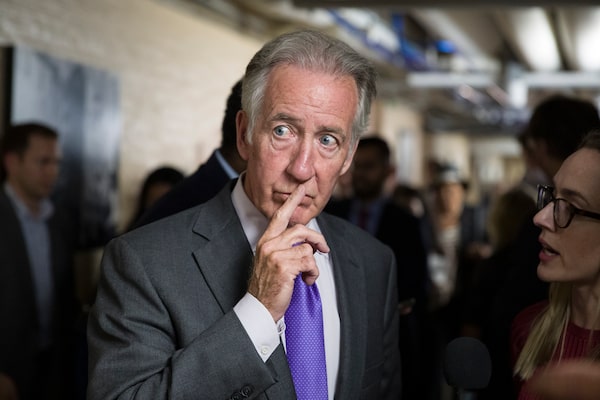
House ways and means committee chairman Richard Neal, seen here on Sept. 24, 2019 in Washington, believes impeachment will not impede USMCA ratification under his watch.Alex Brandon/The Associated Press
The top Democrat charged with getting the revamped NAFTA deal through Congress insists he won’t let impeachment get in his way.
“My pursuit of trying to get to ‘Yes’ is not based on background noise,” House ways and means committee chairman Richard Neal told reporters.
Good luck with that. The buzzing in Mr. Neal’s ears is about to become a deafening roar that will consume Washington, and the country, in the weeks and months ahead.
That’s unfortunate, because prospects had been looking up for the long-stalled U.S.-Mexico-Canada Agreement in recent months. With the United States and China in a trade stalemate, both Democrats and Republicans were eager to get trade moving elsewhere. Getting the USMCA ratified was seen as a way to help U.S. farmers, who’ve been hit hard by Chinese tariffs.
And Democratic negotiators appeared close to getting U.S. President Donald Trump to agree to some relatively minor changes, including measures to enforce the deal's labour provisions.
Both sides say the votes are there to ratify the deal, including a majority of House Republicans and just enough Democrats to get it through.
Ratification would end almost two years of uncertainty that has hung over trade between the three countries since Mr. Trump demanded a reopening of the North American free-trade agreement in 2017.
Now, however, the launch of a formal impeachment inquiry into Mr. Trump makes a vote on the deal much less likely, at least in the near term.
Mr. Trump has accused the Democrats of creating a “manufactured crisis” that would imperil the USMCA and other congressional business.
Impeachment will no doubt suck up all the oxygen in Washington. It will also send Democrats and Republicans scurrying to their partisan corners. The regular business of Congress, which hinges on co-operation and goodwill, could come to a virtual standstill.
“With impeachment under way, why would the Democrats want to give Trump a victory on trade?” wondered Lawrence Herman, a Toronto trade lawyer.
Compounding the uncertain road ahead for the USMCA is the continuing United Auto Workers strike against General Motors, now entering its third week. The trade deal remains highly contentious in the union movement (and its allies in the Democratic Party) because of concerns about the impact of low-wage Mexican labour. House Speaker Nancy Pelosi is unlikely to let the USMCA go to a vote while GM workers are on the picket lines, according to U.S. trade lawyer Daniel Ujczo of law firm Dickinson Wright.
“The optics are terrible,” he said.
Congress is running out of time to deal with the USMCA ahead of next November’s U.S. elections. The next couple of months were widely seen as the last best chance to get the deal to a vote before the campaigning begins in earnest next year.
Ratification likely won’t happen until after the November, 2020, election and before the new Congress gets to work in January, 2021, Mr. Ujczo says.
Another year of delay wouldn’t be in Canada’s best economic interests because it prolongs the uncertainty hanging over business investment decisions.
But it just might suit Liberal Leader Justin Trudeau.
Passage of the USMCA in the U.S. would shine a light on a deal that is particularly contentious in Quebec, where Mr. Trudeau needs to add Liberal seats to stay in power. The province’s dairy farmers are widely seen as the biggest losers in the trade deal as a result of concessions by Ottawa that give U.S. farmers a larger share of the Canadian dairy market.
Conservative Leader Andrew Scheer has accused the Liberals of sacrificing the dairy industry, which is heavily concentrated in Quebec and Ontario, to get the USMCA done. However, he has stopped short of promising to reopen the deal should his party win the election.
Ottawa tabled legislation to implement the trade deal in Canada earlier this year. But the bill was not passed before the House of Commons adjourned for the summer.
Mr. Trudeau likely would prefer not to be defending the USMCA as he campaigns in Quebec.
The state of perpetual limbo for NAFTA 2.0 is bad for Canadian businesses that depend on trade with the U.S. Many may be holding off on making investments, expanding capacity or hiring more workers.
Many Canadians may be looking forward to watching the drama unfold in the U.S. But the Trump impeachment show won’t do the Canadian economy any good.
And there is precious little Canadians can do about it.